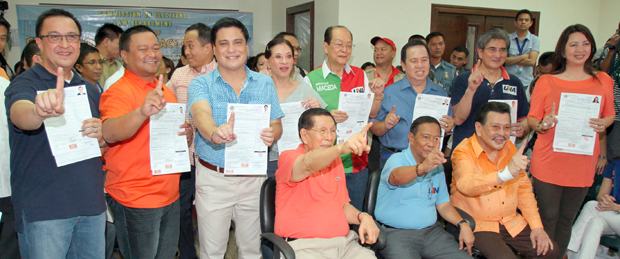
COC’s FILED. Senatorial candidates of the United Nationalist Alliance pose with their signature hand sign while showing their certificates of candidacy (COCs) on October 1, 2012. Photo from Niño Jesus Orbeta.
WITH JUST a few months away from the official 2013 elections campaign period, candidates of different political parties and party-lists are beginning to make themselves heard, all hoping to gain the attention of the public.
Sifting through
Long before the actual voting, the ballot has been made a lot shorter, courtesy of the massive re-screening of party-lists by the Commission on Elections (Comelec). Imposing stricter guidelines, Comelec has already disqualified up to 30 party-lists, not sparing even “incumbent” parties such as the 2010 election’s top placer, Ako Bicol, and Rep. Mikey Arroyo’s Ang Galing Pinoy.
Kabataan Party-list Representative Raymond Palatino welcomed this initiative. He said that the party-list system has been “bastardized” and has lost “its noble objective to democratize participation.” However, he pointed out that the Comelec’s record is not consistent.
“They don’t apply an argument against a party-list to all,” Palatino said in mixed English and Filipino.
Accusations of the poll body’s double standard can also be found in the disqualification sagas of Akbayan and the Black and White Movement, which have been case in the spotlight in recent weeks. The two are commonly identified with the administration, with several Akbayan members currently in government service. While the Black and White Movement has been disqualified, Akbayan has survived the rounds of Comelec judgment.
Political Science Instructor Carmel Abao, the founding secretary-general of Akbayan who served from 1998 to 2001, explained the case of the said party-list.
“Well, I think they really should screen now. One of the problems has been the high number of party-lists today,” Abao said in a mix of English and Filipino.
For Abao, this “elevates a level of discourse in the party-list system.” However, she contests whether the commissions decisions are ideal.
On Akbayan’s disqualification
“Should they be disqualified? No,” Abao said, continuing, “They have real members and these members really come from the marginalized sector.”
One of the arguments against Akbayan is its link to the Liberal Party (LP), the country’s ruling coalition. “Theoretically, they should not be [in alliance with LP because] if you’re in alliance with the ruling party, you are part of the ruling coalition,” Abao noted.
However, Abao said that this only means Akbayan is in good terms with the president. “The alliance with the Liberal Party and the president, I think, does not necessarily mean that [Akbayan] has real power.”
As a party, Abao stressed that the LP is not unified in the way its constituents vote about certain matters in the Congress and Senate. “The thing is, to me, the Liberal Party is not a real party. There’s no party going on in the sense that you can see that in the way they vote.”
Two similar coalitions
For the senatorial race, the inability of both LP and the United Nationalist Alliance (UNA) to come up with full slates has been apparent. Instead, the coalitions share three candidates: incumbent Senators Francis Escudero and Loren Legarda and former MTRCB Chief Grace Poe-Llamanzares. Officially, the three are candidates under the administration, giving the LP a distinct advantage during the campaign.
However, UNA Secretary-General Navotas Rep. Toby Tiangco thought otherwise, “Despite the limited resources that we have compared to the administration we are prepared, our candidates are prepared.”
“We will just see how the three common candidates will respond to the restrictions of the Liberal Party,” he added.
Another pressing issue concerns political dynasties, with public awareness being raised by social media.
Two political clans include members on opposite sides, with former Tarlac Gov. Tingting Cojuangco in UNA and Bam Aquino in LP. The two are the aunt and nephew, respectively, of incumbent President Benigno Aquino III. In addition, Sen. Ramon Magsaysay Jr. is running under LP while Zambales Rep. Mitos Magsaysay is under UNA. UNA’s three leaders Vice President Jejomar Binay, Senate President Juan Ponce Enrile and former President Joseph Estrada all have children running for senator: Nancy Binay, Rep. Jack Enrile and Rep. JV Ejercito.
In line with this, Tiangco cited problems in passing an anti-dynasty bill. “At the end of the day, it is up for the people to decide. Hindi naman lahat ng magkakamag-anak o magkaka-apelyido e magsasama-sama. (Not because some candidates are relatives, they automatically run under the same party.)”
UNA seems ambivalent about its role as an opposition party, reflecting a less polarized, less delineated political atmosphere, unlike during the Estrada and Arroyo administrations. Tiangco asserted UNA’s role, saying that, “We are a constructive opposition [we are ready to] support good programs, yet fiscalize when problems arise.”
Tiangco ended by stating UNA’s vision, “We will not be obstructionistwe want this government to succeed and succeed faster. That is the reason why we offered UNA as an alternative.”



